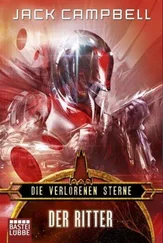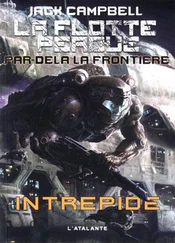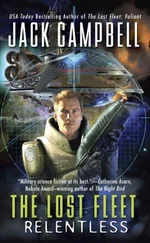Jack Campbell - Dreadnaught
Здесь есть возможность читать онлайн «Jack Campbell - Dreadnaught» весь текст электронной книги совершенно бесплатно (целиком полную версию без сокращений). В некоторых случаях можно слушать аудио, скачать через торрент в формате fb2 и присутствует краткое содержание. Год выпуска: 2011, ISBN: 2011, Издательство: Ace Books, Жанр: Космическая фантастика, на английском языке. Описание произведения, (предисловие) а так же отзывы посетителей доступны на портале библиотеки ЛибКат.
- Название:Dreadnaught
- Автор:
- Издательство:Ace Books
- Жанр:
- Год:2011
- ISBN:978-0-441-02037-9
- Рейтинг книги:5 / 5. Голосов: 1
-
Избранное:Добавить в избранное
- Отзывы:
-
Ваша оценка:
- 100
- 1
- 2
- 3
- 4
- 5
Dreadnaught: краткое содержание, описание и аннотация
Предлагаем к чтению аннотацию, описание, краткое содержание или предисловие (зависит от того, что написал сам автор книги «Dreadnaught»). Если вы не нашли необходимую информацию о книге — напишите в комментариях, мы постараемся отыскать её.
. Geary is charged with command of the third fleet, its first mission: to probe deep into the territory of the alien race to find out more…
Dreadnaught — читать онлайн бесплатно полную книгу (весь текст) целиком
Ниже представлен текст книги, разбитый по страницам. Система сохранения места последней прочитанной страницы, позволяет с удобством читать онлайн бесплатно книгу «Dreadnaught», без необходимости каждый раз заново искать на чём Вы остановились. Поставьте закладку, и сможете в любой момент перейти на страницу, на которой закончили чтение.
Интервал:
Закладка:
“Badaya isn’t stupid, and he knows that Tulev has enough seniority to challenge him if he veers off course. Badaya also knows that without me, he couldn’t hope to control the Alliance. Did you come by to talk politics?”
She locked eyes with him. “Are you turning the fleet around now?”
“No. A few more star systems, then we turn.”
A careful nod. “I am required to remind you that you were ordered to find the boundaries of enigma space.”
“And you have so reminded me. Victoria, why did they send you as one of the emissaries?”
For a moment, her carefully shielded emotions showed. “I volunteered, after receiving an offer I could not refuse. I might have refused anyway, but I didn’t know who would be sent in my place.”
“Did you know your husband was at Dunai?”
“No. I knew it was a VIP labor camp, but Paol was only a commander.”
“A commander married to the Co-President of the Callas Republic.”
She shrugged, the defenses falling back into place. “I really should have thought of that. These people we rescued. What will happen to them?”
“We’ll do our best to look out for them, but they’re all free human beings, so in the end the decisions will be theirs.”
“What deal did you make with CEO Iceni to get that Syndic device for preventing gate collapses?”
The question surprised him because he had thought Rione would already have discovered the answer. “Allowing the implication that I will not act against her. She is planning on breaking free from the Syndicate Worlds. It’s lucky the Syndics came up with that device, isn’t it? It would have been a long trip home without the Syndic hypernet,” he continued, deliberately making the dig to see how she would respond.
“Yes. It would have been a very long trip.” Another nod, then she stood up. “A few more star systems, Admiral? It might be tempting to keep going even after that.”
Her entire attitude conveyed that she thought that would be a mistake, though something was keeping her from saying it right out. “I understand. We’ve plotted out a track for seven more star systems, and the seventh is as far as we’re going.”
Fourteen
From Tartarus, the fleet jumped to Hades, only to find another hypernet gate there. Wondering if they were already nearing the other side of enigma-controlled space, they jumped to Perdition. There was little enigma presence there, but another hypernet gate. A jump from the same jump point almost sideways to the newly named star Gehenna found no gate in what seemed a fairly well-off star system. “Did we loop back deeper into enigma territory somehow?” Desjani wondered. But another jump to Inferno found a similarly long-settled star system, also lacking a gate.
And, at each jump, more and more alien warships could be seen trailing the fleet. As the fleet jumped away from Inferno, the alien armada had grown to more than sixty.
Two more stars, both with hypernet gates. The fleet made another risky dash to the next jump point and found itself at a star once again with a gate.
“Why should we keep going farther?” Armus asked.
Geary gestured to the star display. “We’re close to the turnaround. For every star we’ve been to, we’ve passed by three or four on average. It’s giving us an idea of the strength of the enigmas, but they’re still not talking to us, and we can’t learn anything more about them without triggering probable mass deaths among them.”
“You say that like it’s a bad thing,” Captain Vitali grumbled. Just about everybody else nodded in agreement. Anger at deaths in combat had been magnified as word got around about the state of the humans once held captive by the enigma race.
“Our mission isn’t to kill them. Though we’ve taken out plenty of them up to now.” Geary singled out a star. “This is our next objective. It’s a long jump. We’ll see what’s there, then start jumping back, not retracing our steps, but angling along a different route to avoid running into that pack of warships that keeps following us. Maybe once we’ve left enigma space entirely, having demonstrated our ability to operate within their space but without trying to annihilate them or pushing any more to violate their fanatical sense of privacy, they’ll be willing to consider talking to us and accepting a fixed border.”
Dr. Shwartz gasped in frustration. “The border. Why doesn’t our willingness to discuss respecting a single border matter to them? During the conversations you had with the enigmas at Midway, they kept emphasizing that they owned Midway and other stars, and therefore we had no right to be there. Why isn’t that same thinking motivating them to negotiate with us for a mutually agreed-upon border that would guarantee their ownership of the star systems they now control?”
“It is a discrepancy,” Duellos agreed. “But only one of many.”
Charban, though, gazed at Shwartz as if something had just come to him, seemed about to speak, then subsided with the aspect of someone sunk into thought.
“If I could know one more thing about them,” Badaya said, “I’d want to know what sort of rhyme or reason they use to decide where they put hypernet gates. The idea that the gates are last-ditch, supermines aimed at deterring conquest seems like the best explanation for the first gates we encountered, but then why all these gates inside their territory? And why do we usually see them in consecutive star systems, followed by gaps?”
Commander Neeson spoke up. “I have an idea, a possible explanation, that is.” He pointed to the display. “Seen this way, in three dimensions with our path wending through them, Captain Badaya’s statement is accurate. There doesn’t seem to be any consistency to the placement of the gates. But it’s not just the gates. Defenses inside star systems with gates are also much more robust. I tried running an analysis viewing the data in a different way.” The three-dimensional star field blinked out, replaced by a simple two-dimensional graph.
“The bottom axis here is distance inside alien space, the vertical axis is the level of defenses we’ve seen. The initial alien star systems we entered had substantial defenses, as we’d expect. That’s their border with humanity.” Neeson indicated peaks in the graph near its beginning. “Then defenses tapered off, again as we’d expect. The aliens can’t afford to fortify every star system any more than we can, so they place their defenses on the border.”
Pointing farther along on the graph, Neeson centered the display on another peak. “But here we saw two more star systems with substantial defenses, and those star systems were neighbors in jump terms. Then some more stars without gates, before encountering more gates, again in two star systems that were next to each other for anyone using jump drives.”
Tulev was the first to comment. “Layers of defense? But if so, they’re not spaced in any uniform fashion, and I cannot see the sense in putting extra defenses so far from their borders.”
“Far from their borders with us ,” Neeson said. “We’ve been looking at this as the enigma race. One entity. But if this were human space, and we saw these kind of defenses set up internally, facing each other, how would we interpret that? How would the border between the Alliance and the Syndicate Worlds look to an alien scouting force?”
Geary wanted to slap his forehead. “They’re not unified.”
“Internal borders,” Tulev agreed. “Internal defenses against other members of their own species. The aliens are not unified any more than humanity is. If we judge from the frequency of the defensive lines, they are more divided than we are.”
“Why did we assume they were unified?” General Carabali asked. “Because I realize that I did, too.”
Читать дальшеИнтервал:
Закладка:
Похожие книги на «Dreadnaught»
Представляем Вашему вниманию похожие книги на «Dreadnaught» списком для выбора. Мы отобрали схожую по названию и смыслу литературу в надежде предоставить читателям больше вариантов отыскать новые, интересные, ещё непрочитанные произведения.
Обсуждение, отзывы о книге «Dreadnaught» и просто собственные мнения читателей. Оставьте ваши комментарии, напишите, что Вы думаете о произведении, его смысле или главных героях. Укажите что конкретно понравилось, а что нет, и почему Вы так считаете.












